Possessing towering mountains and windswept deserts, untouched jungle coastlines and cloud forests, snow-capped active volcanoes and large swathes of Amazonian rainforest, Colombia’s natural setting could not be more dramatic.
It is the second-most bio-diverse country in the world, trailing only its neighbor, Brazil.
While naturally stunning in the countryside, Colombia’s cities buzz with a non-stop energy that merits exploration as well. Set to a soundtrack of salsa, reggaeton, and vallenato music, the country’s major cities are always on the move.
For a long time, Colombia was saddled with an unfortunate reputation for drug trafficking and violence, making the news for all the wrong reasons.
Since the dark days of the mid-1990s, the country has undergone a transformation that has restored it to its rightful place as a thrilling and welcoming travel destination.
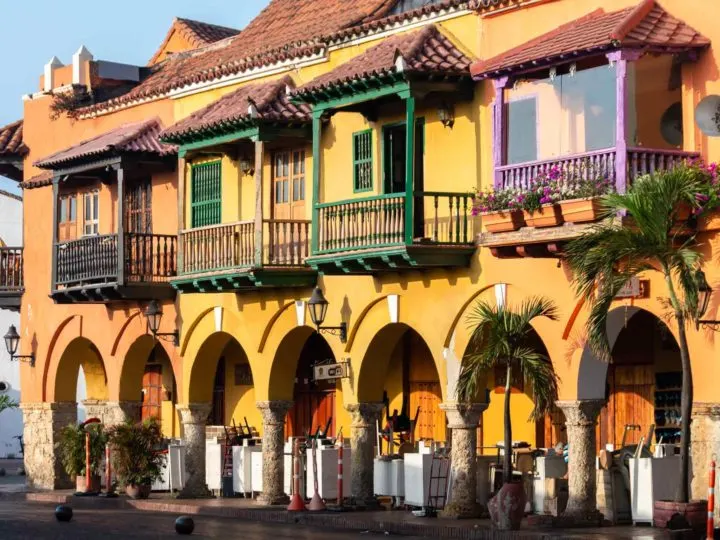
Colombia has an infectious vigor about it. The cities, beaches, mountains, music, dancing, and welcoming people all beckon you to join in the fun. Ready to jump on that flight? First, discover the best places to visit in Colombia.
1. Take in the preserved colonial city of Cartagena
Perhaps the perfect place to begin your journey is in one of the original and best-preserved Colombian cities, Cartagena.
Founded nearly five hundred years ago by Spanish conquistadors, the city originally served as a fortress and base for Spanish incursions further inland, then soon after as an economic and political center for the Spanish vice royalty.
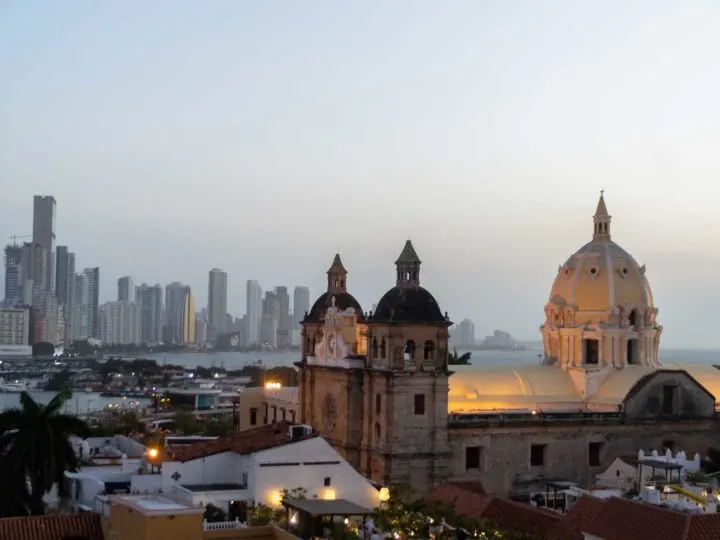
Nowadays, the former wealth and importance of the city are on full display. A stroll around the old center neighborhoods of El Centro and San Diego reveals many opulent mansions housing restaurants, many of Cartagena’s best boutique hotels, as well as fascinating museums, all restored and brightly painted.
Highlights include the shady Plaza de Bolívar, the lovely Casa de Rafael Nuñez, and the grisly Palacio de la Inquisición, which details the sordid activities of the Spanish Inquisition.
A can’t-miss just east of the center across the lagoon is the Castillo de San Felipe de Barajas, a massive fortress built to protect the city and harbor.
As the midday sun can be quite taxing and there is a lack of shade, we advise visiting early in the morning or around dusk for the most relaxed experience.
In the walled city just south of the center is the neighborhood of Getsemaní. Possessing a more bohemian vibe than the statelier center, this is a great area for evening drinks and nightlife and has many of the city’s hostels.
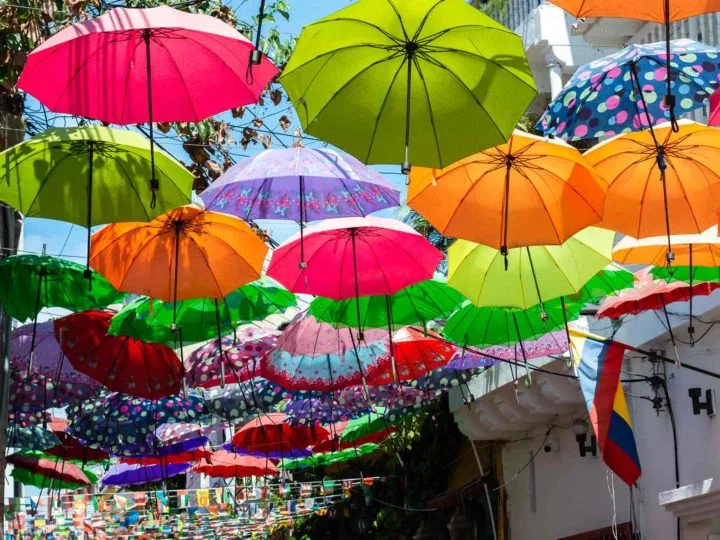
The dining scene in Cartagena is exceptional. One should not miss out on the local criolla cuisine, specializing in fresh seafood. Some great places to try include Alma, Doña Lola, and Restaurante Celele.
Nightlife is another big draw in Cartagena. For a rooftop sundowner, enjoy splendid views and cocktails at Mirador.
For those keen on watching or joining in the salsa scene, head over to Donde Fidel or Café Havana. For pumping house, electronic, and reggaeton, try Alquímico.
Discover other unmissable things to do in Cartagena with our comprehensive local guide and check out other activities beyond the Walled City with our article about the best day tours to take from Cartagena.
2. Beat the heat and relax in laid-back Minca
The perfect respite from the bustle of the coastal cities, the mountain village of Minca is home to a mix of locals, emigres from the city, and expats seeking a change of pace.
An up-and-coming travel destination, Minca draws visitors for its organic coffee and chocolate, unparalleled bird-watching opportunities, and cooler temperatures.
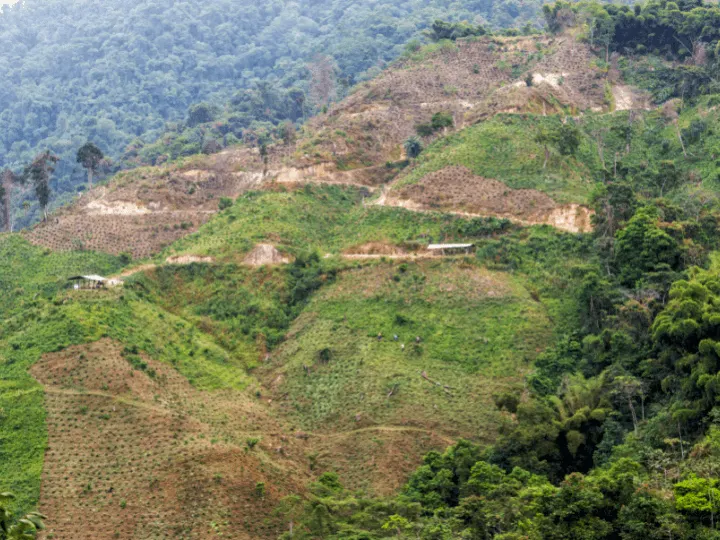
The compact town is a good place to organize your activities, which should include a hike to a waterfall, birdwatching, and a plantation tour to learn about the excellent local coffee and chocolate.
The good people at Jungle Joe will coordinate whatever you are looking to do and have English-speaking guides.
For a relaxing stay, head to the gloriously situated Reserva Natural Tierra Adentro ($82 USD double), with its sweeping views across the valley and resident birdlife (including hummingbirds, parrots, and even peacocks).
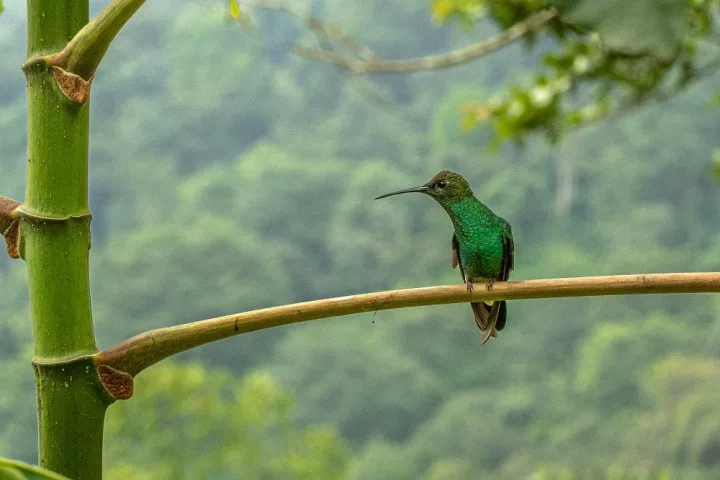
3. Hit the beach at Tayrona National Park
Just east of Santa Marta is the stunning Parque Nacional Natural Tayrona.
Covering a beautiful stretch of forested Caribbean coast under the towering Sierra Nevada de Santa Marta, Tayrona is dotted with hidden coves and secluded sandy beaches: the perfect escape from civilization.
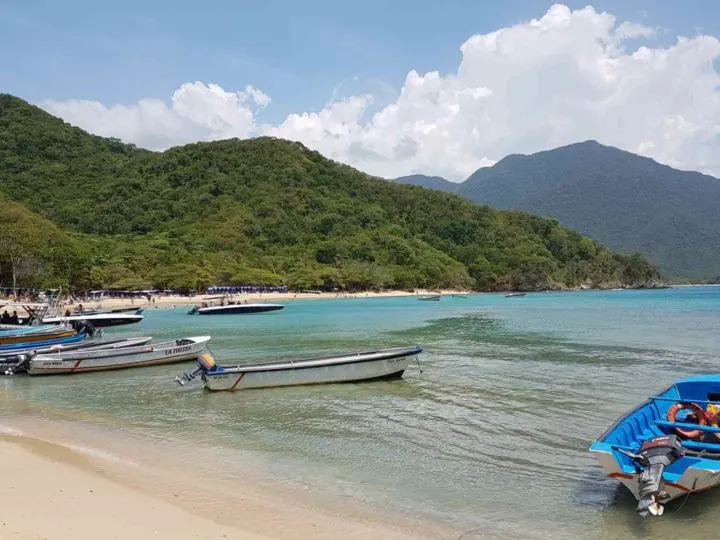
The most popular beach is the beautiful Cabo San Juan del Guía, which has a restaurant and camping site. A more upscale option is to stay at Finca Barlovento, on the beach at Los Naranjos at the east end of the park.
A quieter choice for some time on the beach would be Playa Cristal, which is accessed by boat from nearby Neguange.
Bear in mind when swimming or snorkeling that much of the coastline here has a strong undertow, so be sure to consult with locals about the currents before venturing out too deep.
4. Immerse yourself in a multi-day lost city trek to Ciudad Perdida
One of the great adventures of South America, the four-day trek to and from the fabled Ciudad Perdida is for many the highlight of their holiday.
Known locally as Teyuna, the ‘lost city’ was rediscovered in the 1970s and has since been accessed only on foot and to a limited number of visitors to preserve the site.
The city is thought to have been inhabited between the 11th and 14th centuries and housed up to four thousand people.
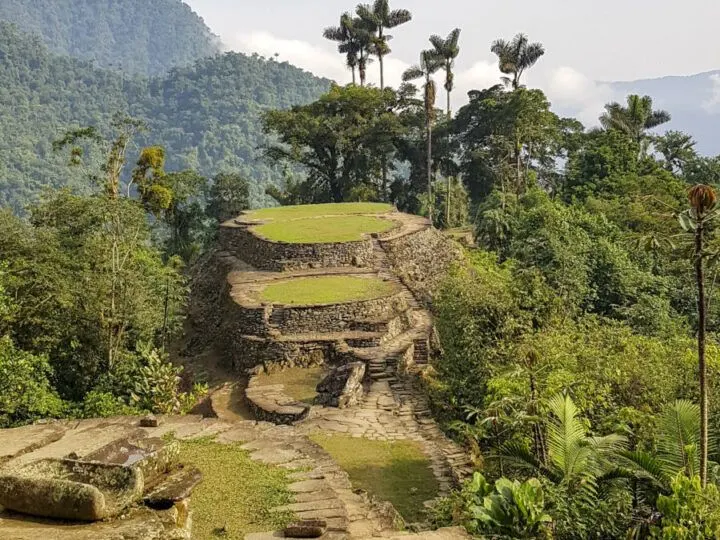
All guide companies are government-certified and will outfit travelers with the necessary equipment, including camping gear, food, and water.
We recommend the professional Expotur, whose guides are indigenous and knowledgeable about the archaeological sites and the surrounding region and its peoples.
Tours leave from Santa Marta, and the hike begins at the end of the road in a village on the slopes of the mountains.
Although the trek can be done all year except September – when the site is closed for maintenance – it is advised to make the trip during the dry season, which runs from mid-December through April. Make sure to bring strong mosquito repellent; local brand Nopikex is highly recommended.
5. Explore the remote Guajira peninsula
At the northern tip of the continent, La Guajira has always been a world apart from the rest of the region. Its indigenous people, the Wayuu, were never conquered by the Spanish, and they retain a clear identity of their own.
Their land is one of stunning contrast, framing untamed sand dunes against the deep blue Caribbean which surrounds them. This is a beautiful corner of Colombia, and one ripe for exploration.
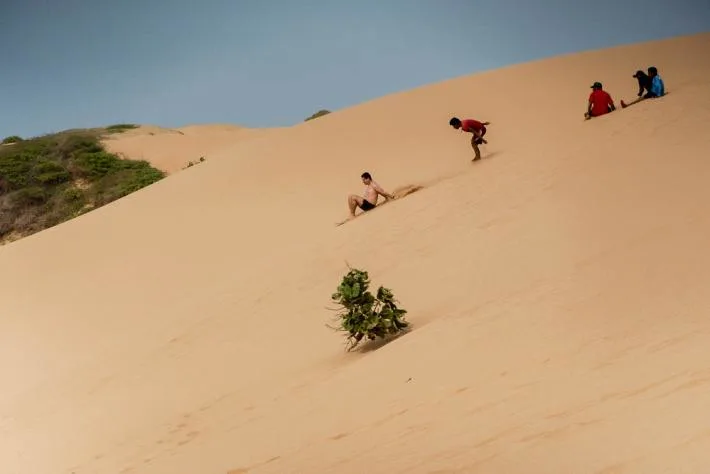
All trips to La Guajira begin in Riohacha, the city gateway to the peninsula. When visiting the region, it is important not to be in a hurry as transport is irregular and can be time-consuming.
Many visitors come for kite surfing, four-wheeling across dunes in the largest Colombian desert, or spotting flamingos at the Santuario de Fauna y Flora los Flamencos.
The northernmost point on the continent is Punta Gallinas, which has perhaps the most beautiful beach in the country, Playa Taroa, sandwiched between the sea and a giant sand dune.
Because tourism is nascent here and few job opportunities exist for the inhabitants of the region, it’s essential to explore La Guajira responsibly. You can do this by taking a four-day tour with Macuira Tours and supporting the Wayuu community directly.
Indigenous-owned, the guides at Macuira Tours really know the region and will give you a fascinating insight into the daily life of those who live in one of the most extreme environments in Colombia. [Read founder Steph’s reporting about how tourism might change the future for the Wayuu of La Guajira]
6. Get your adrenaline pumping in San Gil
Leaving the north coast, thrill-seekers will revel in visiting San Gil, the adventure sports capital of Colombia. There is no shortage of things to do, as visitors can choose between zip-lining, abseiling, white-water rafting, kayaking, horseback riding, and mountain biking.
The friendly folks at Macondo Hostel can organize any adventure you have in mind and have experienced and friendly guides who have tried all the activities.
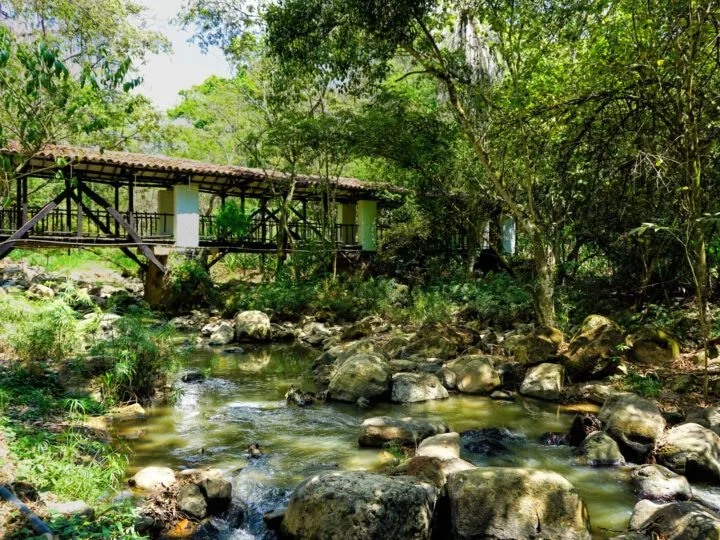
San Gil is also a great place to relax for a few days. On the eastern edge of town is Parque El Gallineral, a wonderful, sprawling reserve on an island in the Río Fonce.
A fifteen-minute drive northeast of town is Pescaderito, a series of five swimming holes on the stream above the village of Curití.
7. Experience Bogotá, one of the continent’s most influential cities
The capital city of Colombia is a microcosm of the entire country. Amidst the hustle and bustle, you’ll find the best food and museums, and see how the city is shaping the future of the nation.
The old center, La Candelaría, sits directly beneath Cerro Montserrate and its shining white church, one of the most famous landmarks of Colombia. It’s also a great starting point for sightseeing in Bogotá.
Although this metropolis of over ten million people has tons of neighborhoods, restaurants, and museums to explore, most of the best places are concentrated in the barrios of La Candelaría and Chapinero.
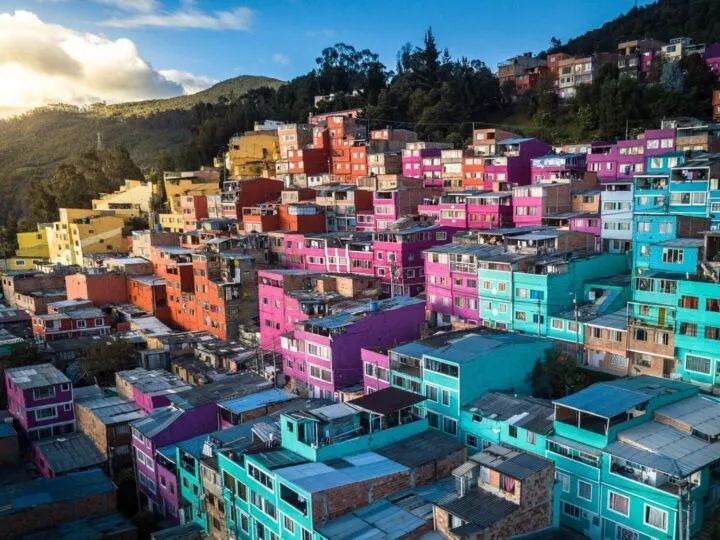
When traveling to Bogotá Colombia, a must-see is the Museo Botero, featuring the art of Medellín-native Fernando Botero as well as works by Picasso, Chagall, and Monet.
Another with excellent exhibits is the Museo de Oro, which has an amazing collection of pre-Columbian gold artifacts.
The capital city of Colombia also represents the cutting-edge of national cuisine. New restaurants in Bogota are opening each year focusing on fresh, local Andean ingredients. For a gastronomic experience, head to Mesa Franca, El Cielo, or the more traditional La Puerta Falsa.
8. Witness the transformation of Medellín, Colombia’s most comfortable city
Many travelers who have watched a certain TV series have gotten the wrong idea about Medellín. But most of them have a very different opinion after spending a few days in Colombia’s second city.
For a start, the climate is ideal, with year-round daytime highs around 28°C (82°F) and lows around 17°C (63°F), meaning it’s always the best time to visit Medellín.
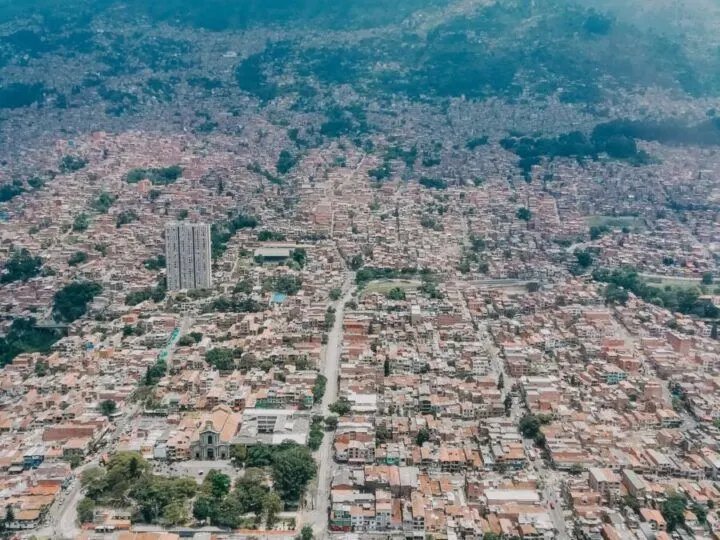
Many visitors choose to stay in the Poblado neighborhood, which has many good hostels and restaurants catering to the backpacker set.
Other travelers seeking more local environs opt to stay in the leafy, affluent neighborhoods of Laureles or Belén, each one of the best places to stay in Colombia.
Visitors wishing to know the city’s painful past and subsequent rebirth should visit the Museo Casa de la Memoría, which details the origins of the conflict and individual experiences of those who lived through it or do Impulse Travel’s brilliant We Don’t Talk About Pablo tour [Steph’s note: read my experience of this tour and how it shows Medellin transformation].
Among the best activities is a full day at Parque Arví, where you can go hiking, bird watching, hire mountain bikes, or have a picnic overlooking Medellín.
Getting there is half the fun, as the park is accessed by a cable car rising high above the city.
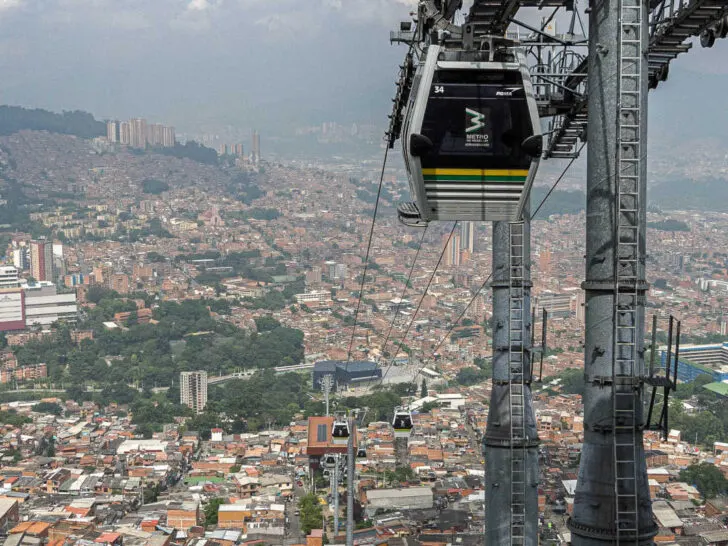
Visitors looking to eat local should seek out the Bandeja Paísa, a platter heaving with pork, avocado, arepa, rice, beans, eggs, fruit, vegetables, and more pork for good measure.
PaloSanto in Laureles puts out a good rendition of the dish.
9. Visit the Eje Cafétero, Colombia’s prime coffee-growing country
South of Medellín between the three cities of Pereira, Armenia, and Manizales lies the region where your morning cup of coffee may come from.
The Eje Cafétero (Coffee Axis) is set in lush rolling hills beneath the snow-clad Nevado del Ruiz, the volcano that in part makes the region so fertile. The bucolic setting and down-to-earth local population make this one of the best places in Colombia.
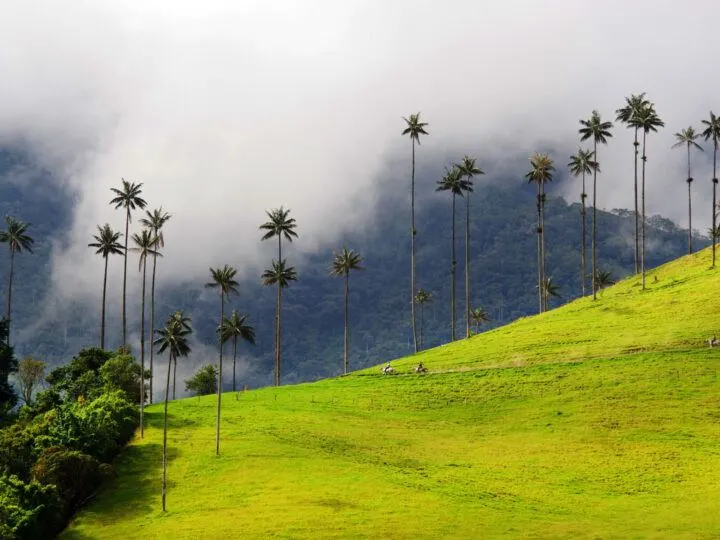
Travelers should base themselves in the charming town of Salento, which is nearby the stunning Valle del Cocora, with its cloud forest and iconic wax palm trees.
A trip to the area is of course incomplete without a tour of a local coffee-growing finca (plantation), and we recommend Café Don Manolo outside of Pereira for a tour led by the owner himself or stay overnight at one of the best hotels in Colombia, Hacienda Venecia, a coffee farm turned gorgeous guesthouse.
While in Salento, don’t forget to try Colombia’s national game, tejo, in which the player lobs a stone disc at small packets of gunpowder. It goes well with a local beer and is a great way to join in some local fun.
A great way to get around the area is in one of the many classic Willy’s Jeeps that bring locals and tourists alike from town to town.
10. Lose yourself in a well-preserved colonial village
The map of Colombia is dotted with beautiful colonial-era villages that are effectively living museums and should be on everyone’s list of what to see in Colombia.
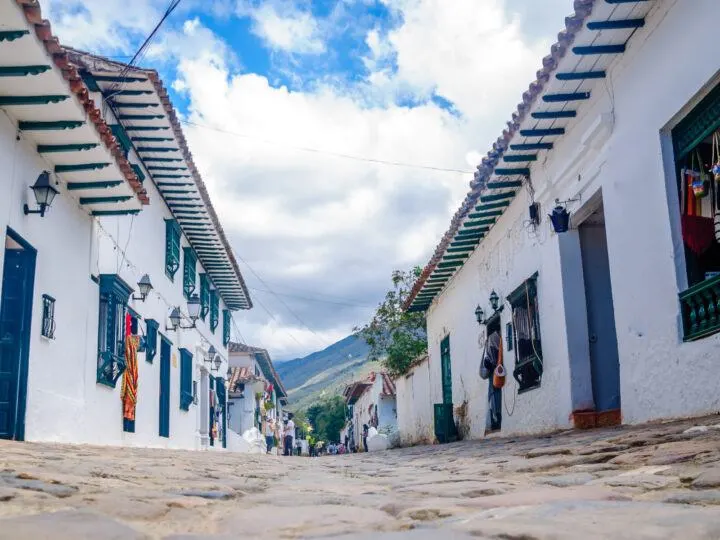
Most of the country is within range of one, with the best examples being Barichara near San Gil, Villa de Leyva north of Bogotá, and Jardín or Santa Fé de Antioquía outside of Medellín. Each has a beguiling charm with a central plaza, stately church, and cobbled streets, surrounded by idyllic mountains, waterfalls and forests.
11. Trek the gorgeous Tatacoa Desert
South of Bogotá and the Eje Cafétero, next to Colombia’s main artery, the Magdalena River, is an unexpected micro-climate.
You’d be forgiven for thinking you’ve stumbled onto the set of a Western film as you walk among the adobe-colored rock formations and spiky cacti of the Tatacoa Desert.
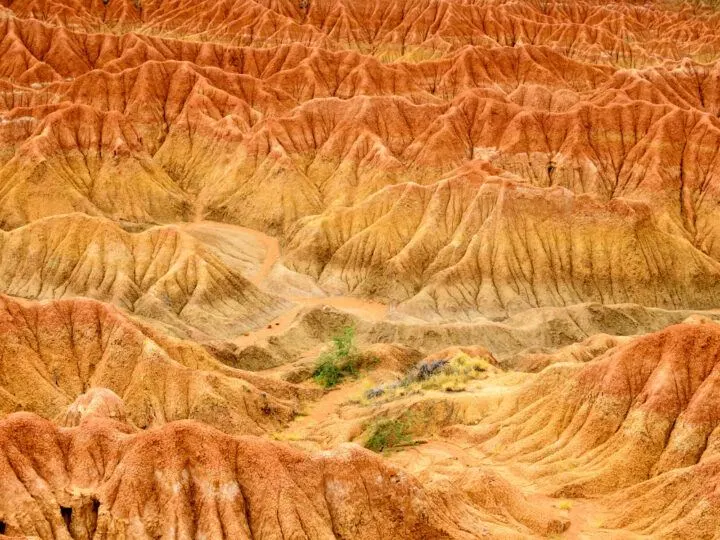
While here, you can expect to see various bird species, scorpions, and spectacular views of the distant mountains. At night, don’t miss a visit to Observatorio Astrosur, which offers outstanding views of the night sky.
12. Tap into your wild side on the Pacific Coast
While the Caribbean coast is on the well-worn traveler path, the Pacific coastline in the department of Chocó is remote, wild, and largely unpopulated.
Access is difficult and mostly by small, chartered plane, but the rewards for visiting are rich indeed.
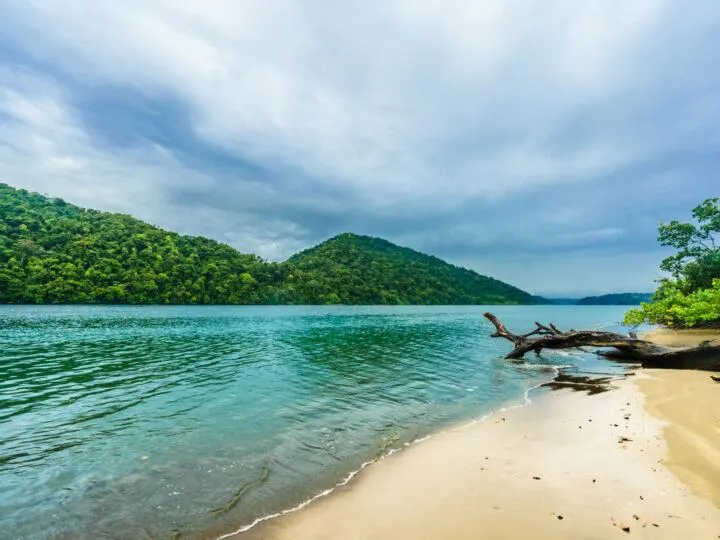
In recent years, more intrepid travelers have found their way to Bahía Solano, El Valle, or Coqui for diving, surfing, and river canoeing, respectively.
Ankla Azul is a professional diving outfit in Bahía Solano and dives regularly sight whale sharks and manta rays. The beach at El Valle has consistent two-meter swells, and good boards are available for hire.
For canoe trips upriver and visits to indigenous communities, make arrangements in the town of Nuquí or the nearby village of Jurubidá.
Make sure to bring rain gear, strong insect repellent, and a mosquito net when visiting the region.
13. Explore the rainforest along the Amazon
A huge portion of Colombia is covered in the Amazonian rainforest, so of course there are opportunities to explore one of the most bio-diverse regions on the planet.
Because much of the Amazon region is remote and security can be an issue, travelers must base their jungle adventures out of Leticia, in the southeast corner of the country along the border with Peru and Brazil. Access is by plane from Bogotá or boat from Peru or Brazil.
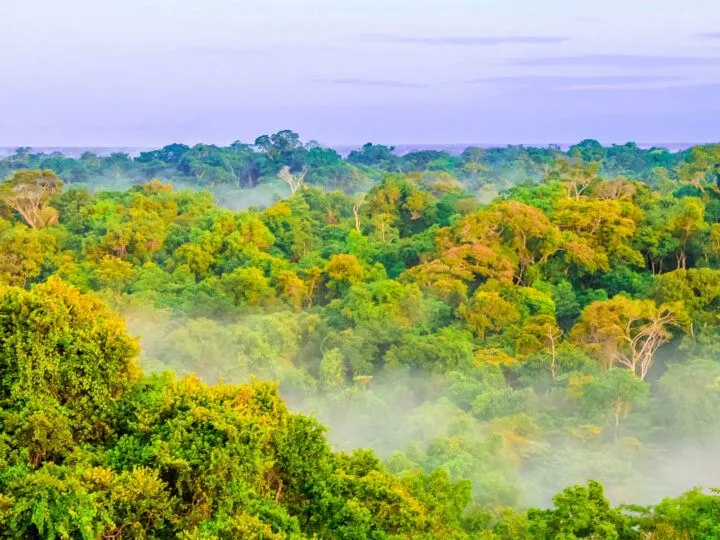
Within the small city of Leticia are the only trappings of civilization in the region, and you may wish to visit the wonderful Mundo Amazónico gardens to learn about the local flora and fauna before beginning your trek.
Amazon Jungle Trips comes highly recommended, with over thirty years of experience and English-speaking guides.
Leticia is also the place to organize trips into the hinterland. Amazon Jungle Trips can arrange expeditions to the outstanding Parque Nacional Natural Amacayacu, one of the best South American tourist destinations. There are very few roads here, so nearly all transport is by boat.
14. Get down to the rhythm of Cali
Colombia’s third-largest city, Cali is synonymous with salsa, the driving beat of southwestern Colombia. Temperatures are hotter than in Bogota and Medellin, and the favorite local pastime is to dance away the warm evenings till dawn in any of the salsa bars or clubs found around town.

Although it’s tough to recommend a single place in this salsa-obsessed city, for a taste of real salsa caleña you should head to La Topa Tolondra or Malamaña Salsa Bar. Settle in for an aguardiente or rum before joining in the fun. If visiting in June, don’t miss the weeklong annual Feria de Cali which features some of the world’s top salsa bands and dance shows.
During the day, don’t miss the historic Plaza de Caicedo in the historic center, as well as the leafy Parque Simon Bolivar along the Cali River.
15. Discover the ancient heritage of the pre-columbian San Agustin civilization
One of South America’s lesser-known yet compelling archaeological sites is growing in popularity for its remarkable megalithic sculptures and burial grounds. A Unesco World Heritage Site since 1995, the San Agustin Archaeological Park has the world’s largest known necropolis.
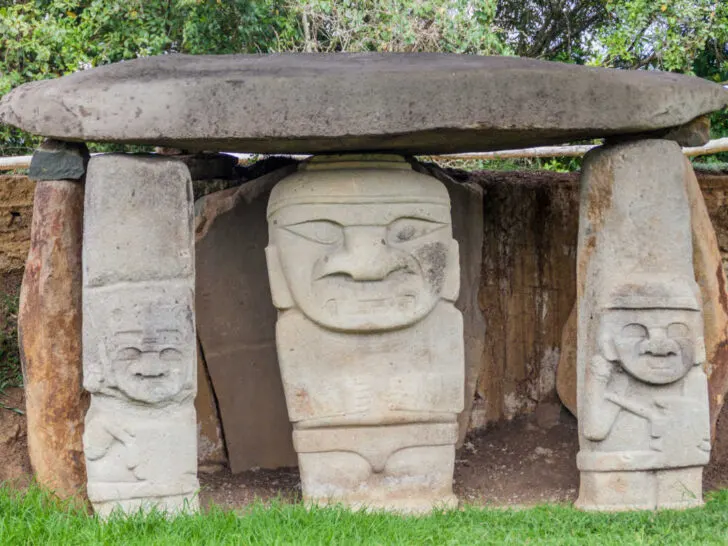
Inhabited between 0 and 400CE, the San Agustin civilization predated the Inca by a millennium. It wasn’t until the mid-18th century that the site was rediscovered due to its remote location. San Agustin is located a three-and-a-half-hour drive southeast from Popayán in the south of the country.
16. Trek across jungle mountains to limestone caves at Cueva de los Guácharos National Park
An hour south of San Agustin is another of Colombia’s less-visited gems, the Cueva de los Guácharos National Park. Its namesake is the brown, nocturnal bird that inhabits the gorgeous limestone caves within the park.
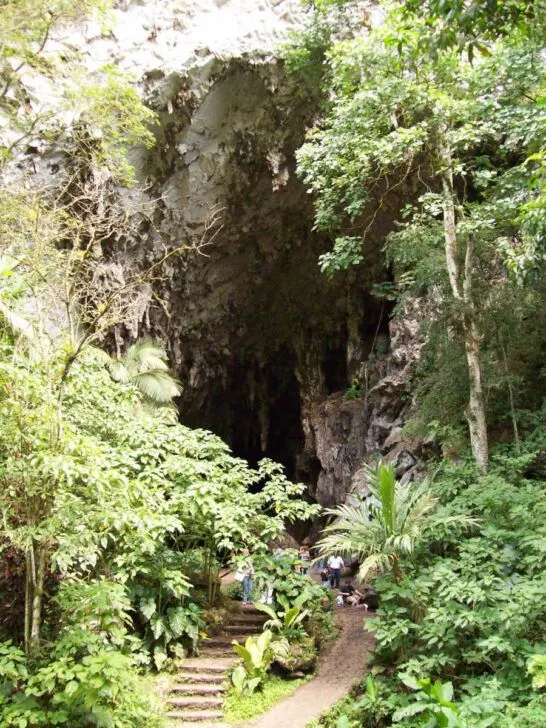
An amazing experience for the intrepid hiker, the park is best visited on a two-day trek through cloud forest from the town of Palestina on a guided tour through Baquíanos.
For more on Colombia’s natural splendor, check out our extensive guide to its best national parks.
17. Camp and ride horses in the shadow of an active volcano at Galeras Sanctuary
Further south, approaching the frontier with Ecuador, is the spectacular Santuario de Fauna y Flora Galeras (Galeras Animal and Plant Sanctuary). Sitting above the city of Pasto, this wildlife refuge boasts crater lakes, cloud forest, and wildlife generally found further south in Ecuador and Peru.
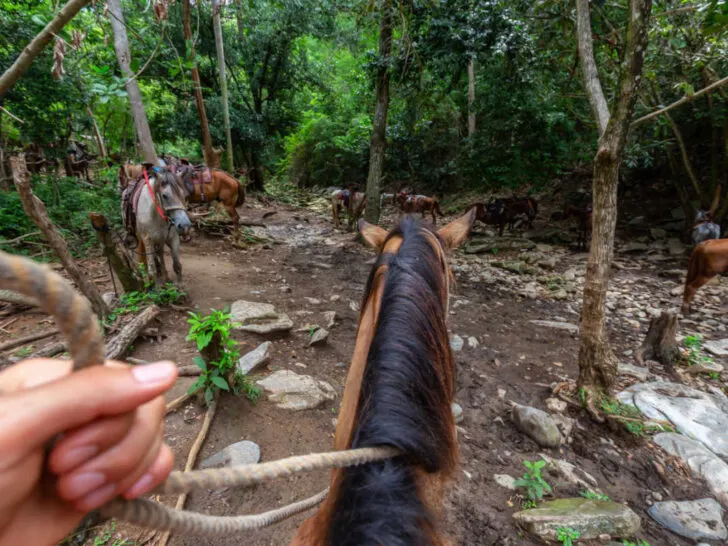
The park is home to the active Galeras Volcano (last eruption 2010), and although the peak is closed to climbers, Ecoglobal Expeditions can arrange multi-day camping trips with horseback riding.
18. Plan an adventure in Colombia’s cowboy country at Tuparro National Park
One of Colombia’s most remote areas, Tuparro National Park is located in the east of the country where the rain forest makes way for the plains of Los Llanos further north. This is a land of extremes, where the dry season sees scorching temperatures and endless prairie land, and the rainy season inundates much of the region for months at a time.
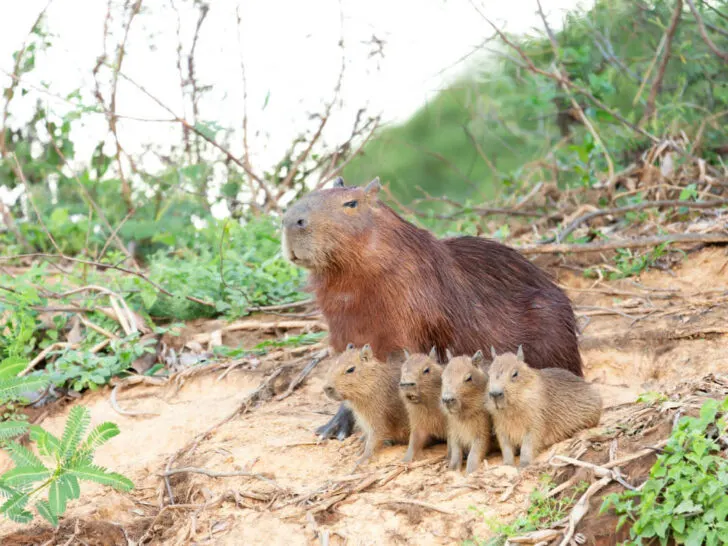
Many locals still rely on horses for their livelihood, and it’s a great place to spend some time in the saddle seeking some of the area’s amazing wildlife. In this tough but starkly beautiful land, you can expect to spot peccaries, armadillos, and tapirs, as well as caymans and capybaras in the Orinoco River.
19. Journey far off-grid to the untouched rain forests of Guaviare
A large portion of Colombia is covered in old-growth rainforest, and while many visitors choose the more popular Amacayu National Park, more travelers are discovering the stupendous Guaviare region as an alternative that sees fewer tourists.
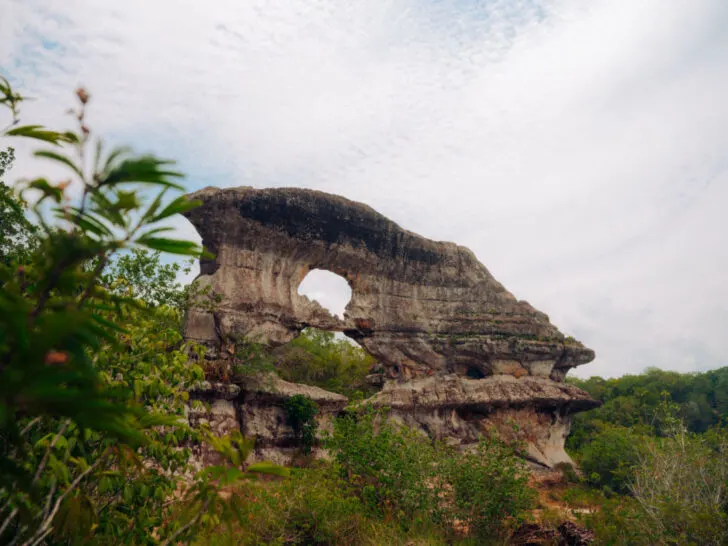
From the gateway of San José del Guaviare, visitors can sign up for tours up and down the Guaviare River where you can swim with river dolphins, or into the interior for waterfalls and pools, ancient cave paintings, amazing bird-watching, and prime hiking trails through ancient forests. Although intrepid travelers can do this trip on their own, we recommend maximizing your time and benefiting from local expertise with locally-run Geo Tours.
20. Go whitewater rafting with ex-insurgents in Caquetá
It may strike you as a dicey prospect, but one of the best adventures to be had in Colombia is led by people once armed and opposed to the national government. Fear not, however, as the landmark peace agreement between Bogotá and the FARC insurgency has done wonders for national security and given rise to eco-tourism in areas once off-limits to travelers.
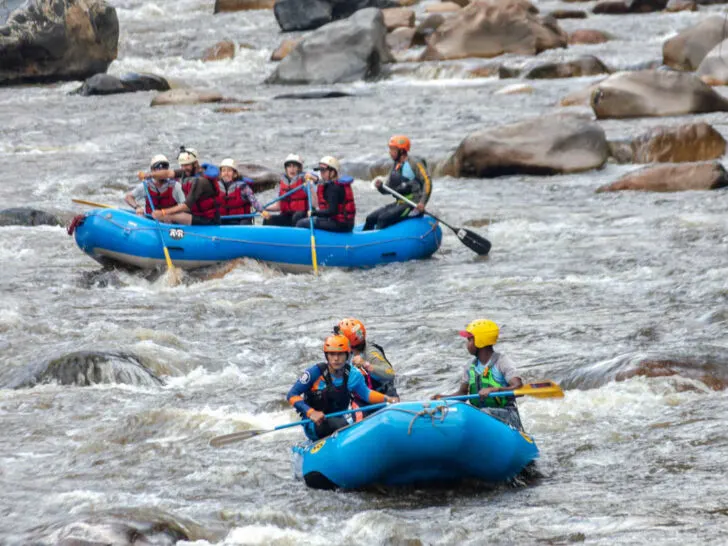
A prime example is the whitewater rafting tour led by Impulse Travel, a local tour operator dedicated to sustainable tourism while supporting the communities formerly engrossed in the decades-long insurgency.
As for the rafting, it’s among the best to be found in South America. Tours run down the Pato River in the remote Caquetá region, and visitors shouldn’t miss the Museo Local de la Memoría Histórica (Local Museum of Historical Memory) in the village of Miravalle, which offers insight into the past conflict and the region’s subsequent transformation.
21. Make the trek through mountains and jungle to Caño Cristales
Offering an amazing variety of mountain, jungle, and plain habitat, La Serranía de la Macarena National Park is one of Colombia’s wildest corners. Its most famous draw is the pink-hued Caño Cristales River, which gets its color from a riverweed native to the region.
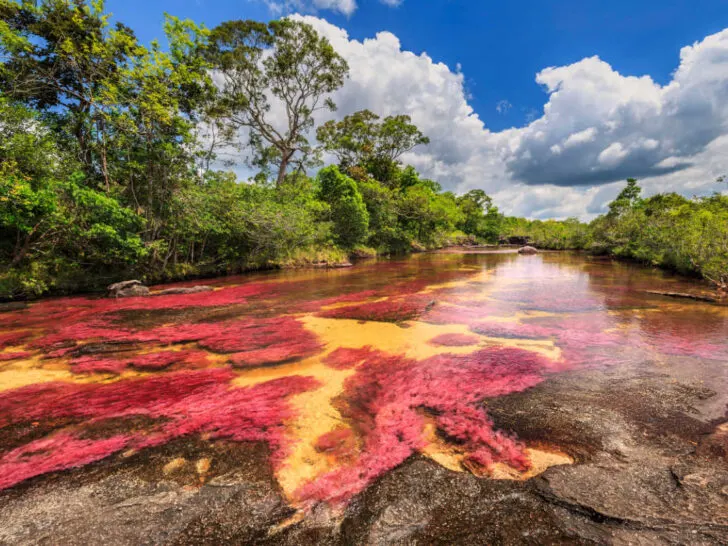
To make the most of your trip, go with Palenque Tours, who offer epic four-day trips to the park. Along the way, you will visit waterfalls and natural pools, spot local wildlife, and stay with local families in the village of La Macarena.
22. Explore Colombia’s lowland jungles and highland plains in Los Yariguíes
Between the low-lying jungle and the snow-capped peaks of the Andes Mountains, Los Yariguíes National Park offers an unparalleled variety of ecosystems, flora, and fauna. This park covers a total elevation range of 2700 meters (9000 feet) from sultry river valleys to wide expanses of high plains with icy blue lakes.
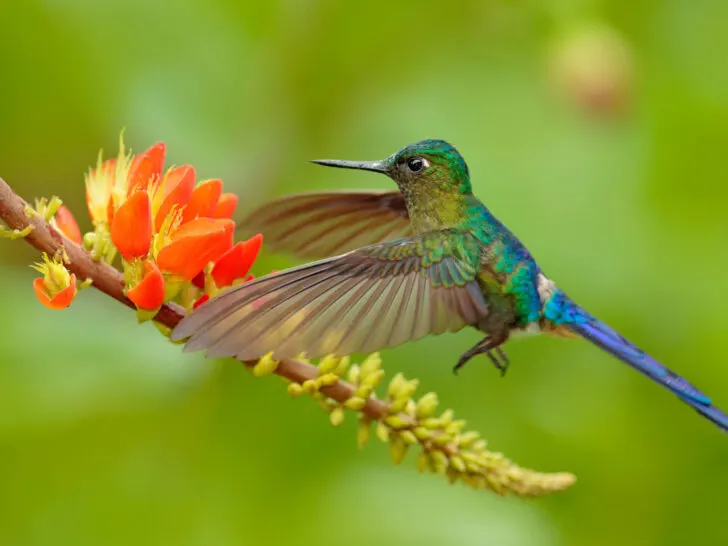
If you’re looking to fit in Colombia’s highlands and jungles into a single trek, this could be your best bet. We recommend Asocapayari, a local tour outfit that supports sustainable eco-tourism and the local community.
23. Spend a few days above the clouds in El Cocuy
The most epic of Colombia’s highland treks, El Cocuy National Park features the best of Colombia’s high-altitude landscapes, flora, and fauna. Keen hikers will relish the ridgeline paths and wide open expanse in Colombia’s central mountain range.
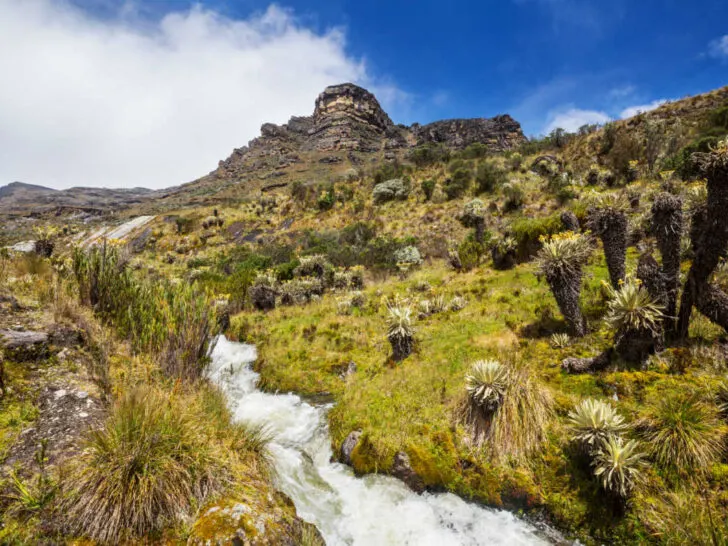
Above the treeline, the windswept tundra is home to eagles and spectacled bears, and there are great opportunities for camping for those so inclined. Living Col offers guided treks to El Cocuy, lasting either 3 or 4 days.
24. Take in Colombia’s best vista at Guatapé
Two hours east of Medellín is one of Colombia’s most popular attractions: Guatapé and the massive lake adjacent. Many local paisas come here to enjoy a day on the water, and visitors can take their pick from boat tours, sailing, kayaking, wakeboarding, waterskiing, or jet skiing.
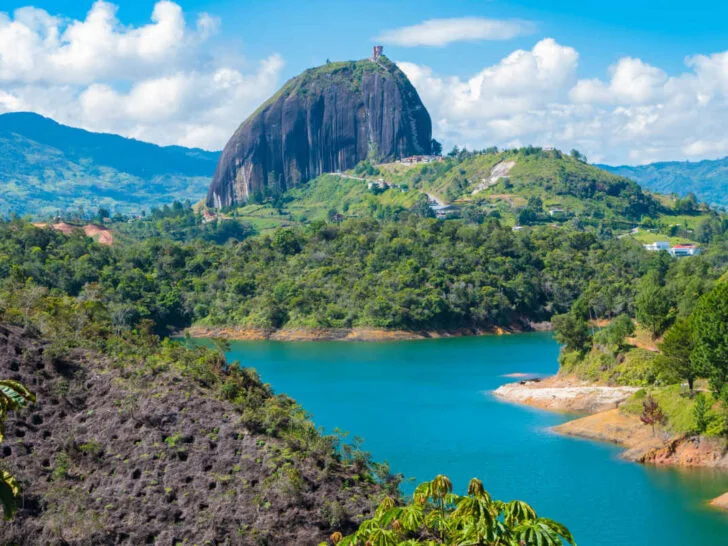
The must-see attraction at Guatapé is the view from atop El Peñól, a massive rock towering over the lake. There’s a cafe at the top where you can sip a coffee with an unbeatable view.
While you’re here, check out our guide to the most beautiful lakes in South America.
25. Reimagine Colombia’s colonial past at Mompox
Among the most atmospheric towns in South America, Santa Cruz de Mompox is a beautifully-preserved colonial town in the marshy lowlands of Northern Colombia. The town center is a Unesco World Heritage Site and features stately villas and churches brightly painted and immaculately preserved.
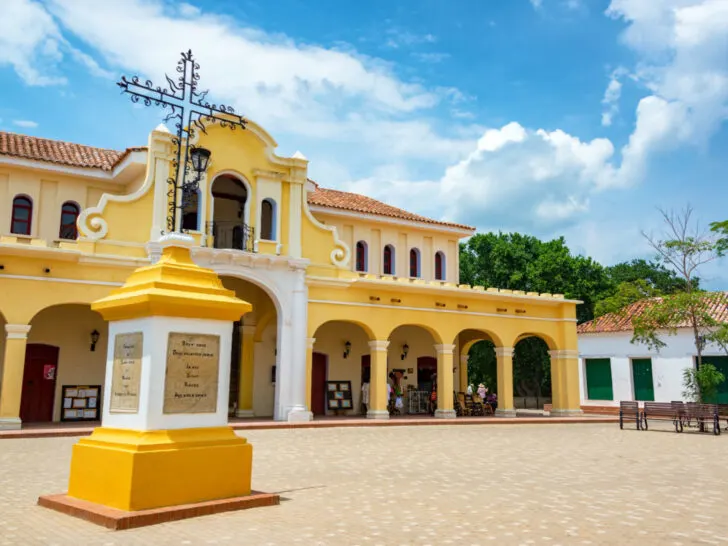
The town is quite remote but sits at a strategic point on the Magdalena River which connects the center of the country to the northern coast. Many who visit do so to imagine the fictional town of Macondo from Colombian Nobel laureate Gabriel Garcia Marquez’s One Hundred Years of Solitude.
26. Join in the Carnival fun in Barranquilla
At the mouth of the Magdalena River on the Caribbean coast is Colombia’s largest port city, Barranquilla. Although generally regarded as a workaday city, Barranquilla comes alive every February for South America’s second-most popular celebration of Carnival.
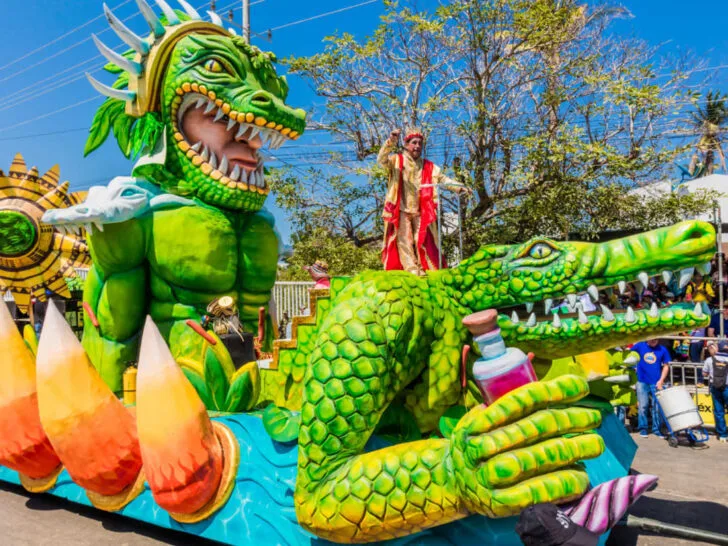
As you might be able to tell by its native daughter, Shakira, the city lives and breathes music. Everywhere you go you’ll hear anything from salsa and vallenato to reggaeton. The African influence on the local music and Carnival celebration is apparent, and along with Cali the city is one of the best places in South America to dance the night away.
27. Discover Colombia’s African roots in La Boquilla
For a good look into Colombia’s African heritage, and especially how it has shaped its music, head just north along the coast from Cartagena to La Boquilla. This beachside community is the birthplace of cumbia, Colombia’s national dance.
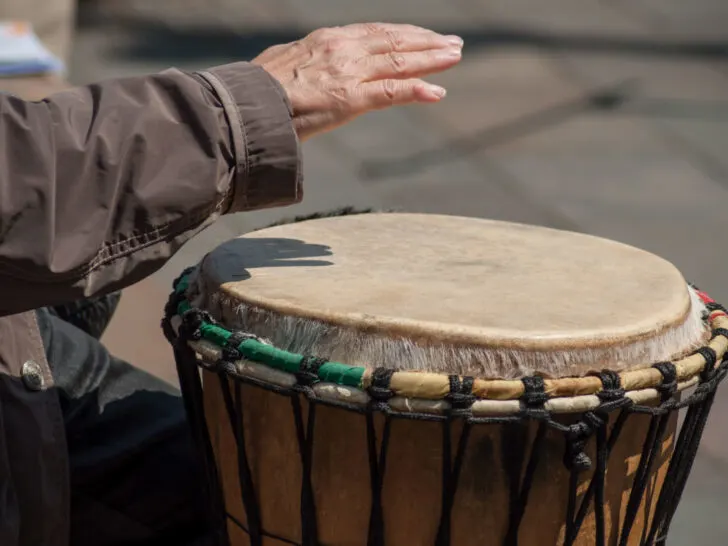
For a deeper dive into cumbia, take a daylong tour to learn how traditional drums are made, the rhythm that drives the dance, and join in on a jam session on the beach.
28. See bioluminescent plankton at Playa Blanca, Isla Barú
If you’re after an otherworldy experience, don’t miss seeing the glowing blue plankton after the sun sets at Playa Blanca. Although nominally an island, Isla Barú is in fact a peninsula that juts out into the Caribbean just south of Cartagena.
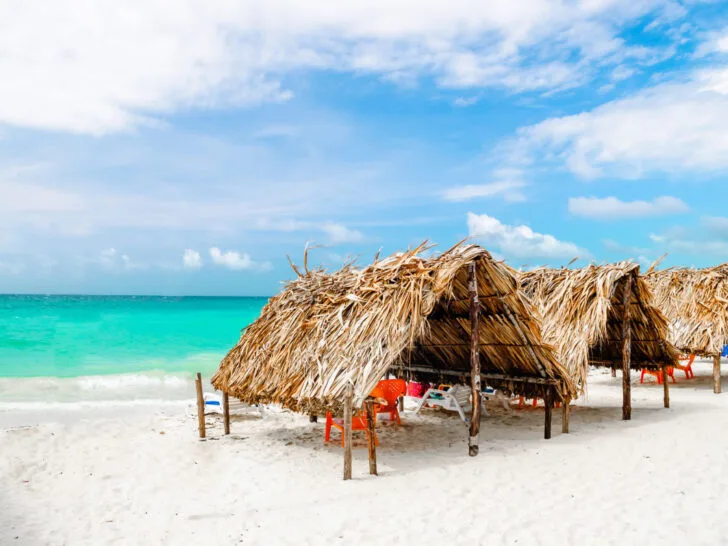
Not only can you easily spot them from the beach, but you can swim amongst the plankton for a one-of-a-kind experience. For a tour of the peninsula followed by a visit to the beach after dark, contact Las Islas.
29. Find your beach and diving paradise at San Bernardo
Further south of Cartagena is the picture-perfect archipelago of San Bernardo. Lacking the hordes of tourists of the neighboring Rosario islands, this is the place to kick back and enjoy the beach.
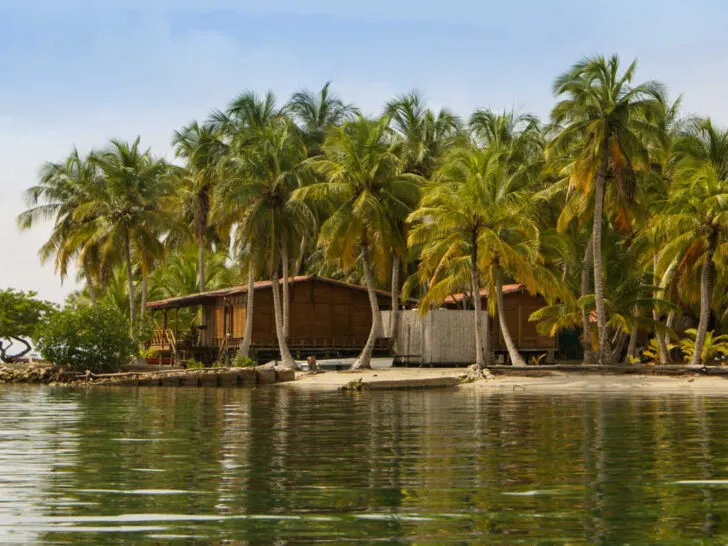
The clear, turquoise waters surrounding the islands are great for snorkeling and diving, and both reef and wreck dives are possible. Agenda del Mar can make all arrangements for your dive.
For more on all the great activities nearby Cartagena, check out our guide.
30. Get your fill of sun and sand on San Andrés
A fair distance north of the coast in the Caribbean are two islands isolated from the rest of Colombia, San Andrés and Providencia. The former of these is one of the country’s premier destinations for both Colombians and foreign tourists.
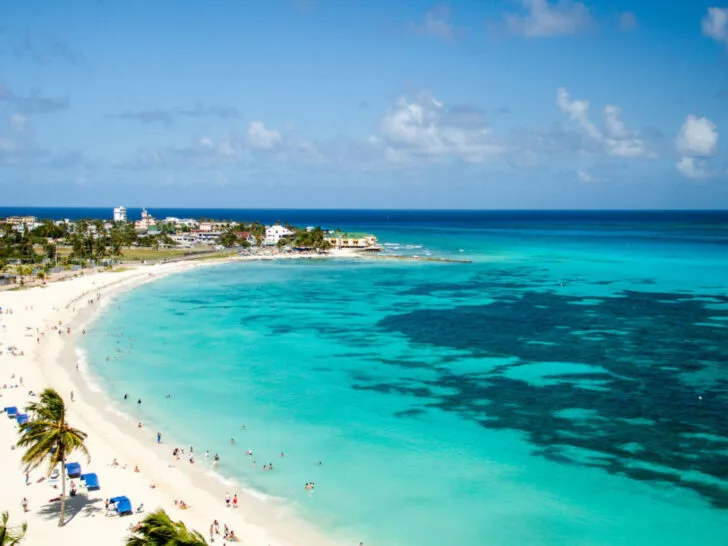
On San Andrés, visitors can choose from all sorts of activities, from snorkeling Johnny Cay and reef diving to kayaking through mangroves and soaking up the sun. Although the island can be overrun by local tourists (especially on weekends and holidays), the turquoise waters and fresh seafood are among the draws that make it worth your trip.
31. Chill out on Providencia, a quiet Caribbean gem
While San Andrés gets the crowds, its neighboring island Providencia sees fewer visitors and has a more laid-back vibe. While it takes a bit more time and effort to reach (you can fly or take a three-hour catamaran from San Andrés).
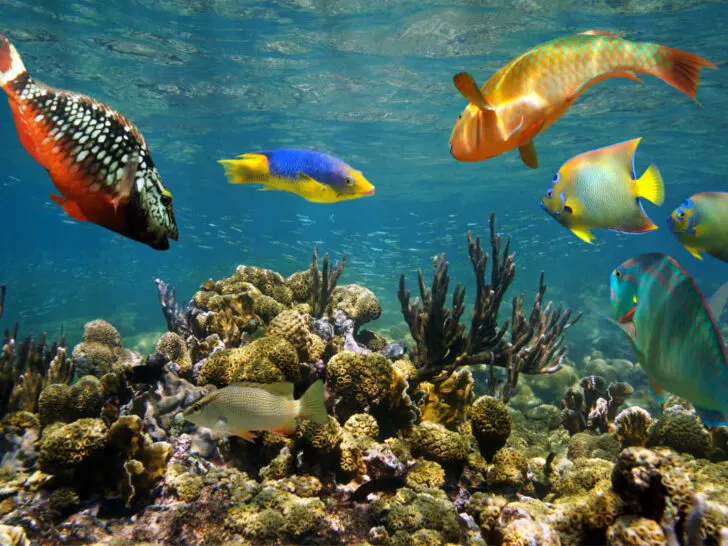
Unlike in most of the country, locals generally speak English (English Creole is still the mother tongue here), and you won’t have to queue up to explore the pristine beaches, reefs, and hiking trails found here. Don’t miss the panoramic view from The Peak in the center of the island.
FAQs about Colombia
1. Where is Colombia?
Colombia occupies the northwest corner of South America, just south of Panama and north of Peru, with extensive coastline on both the Caribbean and the Pacific. It’s a two- or three-hour flight south from Miami and covers a wide range of climatic zones, from deserts and reef-fringed coasts in the north to endless wetlands in the center; rolling farmlands in the heartland and endless tracts of untouched rain forest, all crisscrossed by three parallel ridges of the Andes mountains.
For more information on the best places in Colombia, check out our Colombia travel guide, filled with itineraries for every traveler.
2. Can I travel to Colombia right now?
Yes! Colombia is open to travelers from most countries, and all destinations are open to tourism with bio-security regulations in place, while visitors are required to be vaccinated against Covid-19. Tourism numbers remain reduced compared with pre-pandemic, meaning it’s actually the best time to visit Colombia.
3. Is traveling to Colombia safe?
For travelers who practice common sense, Colombia is a safe place to visit. Avoid being a target by being discreet with valuables such as phones, watches, and money, and take taxis directly to your destination when out after dark. Some areas in the big cities of Colombia experience violent crime, but travelers rarely find themselves in these neighborhoods.
4. Which places should I avoid in Colombia?
Since the end of the civil war and the disbanding of the paramilitary FARC, national security has improved dramatically. That said, there are still insurgents in remote corners of the country. Tourists almost never encounter trouble, as these groups are based deep in the jungle far from civilization.
